SFO: Can it survive Tchenguiz humiliation?
- Published
- comments

Vincent Tchenguiz has already made it clear that he will sue the SFO for £100m in damages
The Serious Fraud Office (SFO) acquired the nickname of the Serious Flawed Office in its early years of operation as a unit fighting big financial crime in the 1990s. That was after a series of flops of high profile cases, against George Walker, the Maxwells and Roger Levitt.
Latterly its reputation has improved, although its decision to drop the Saudi Arabian aspect of a corruption case against BAE Systems saw it widely criticised, because it was seen to be buckling under pressure from the then government of Tony Blair.
In this too-long roster of SFO boo-boos and setbacks, today's judgement - that warrants obtained by it for searching the homes and business premises of Vincent and Robbie Tchenguiz were unlawful - is perhaps its most embarrassing.
In an existence of almost 25 years, the SFO has never commanded much respect from the police or from its counterparts at the Financial Services Authority (FSA), the City watchdog - whose own performance in taking action against financial wrongdoers is perceived to have improved from a very low base.
What FSA officials say about the SFO is frequently not repeatable in polite company.
In its own defence, the SFO has consistently argued that its budget is too small to give it a fighting chance of meeting the expectations of politicians and the public: those it investigates and prosecutes can usually afford the most expert and expensive lawyers and advisers.
In 2008-09, for example, the SFO had a budget of £53m. That fell to £36m in 2010-11 and to £33m last year. By contrast, the FSA's budget for enforcement and fighting financial crime was £75.4m in 2011-12, which was 11% up on the previous year.
The reason the SFO has been squeezed, while the FSA has not, is that the SFO is financed by taxpayers whereas the FSA is funded by a levy on financial institutions.
So although the judgement in today's case was humiliating for the SFO, it took comfort from the remarks of the High Court judge Sir John Thomas that "incalculable damage will be done to the financial markets of London, if proper resources, both human and financial, are not made available for such investigations and prosecutions in the financial markets of London".
And, as it happens, the resources available to the SFO may be squeezed further still if - as is likely - it is ordered to pay the defence costs of the Tchenguiz brothers, which run to many millions of pounds.
Also, one of the Tchenguizes, Vincent, has already made it clear that he will sue the SFO for £100m in damages. And I am told by sources close to his brother Robbie that he too will claim damages of a similar magnitude.
The humiliation for the SFO, if taxpayers are forced to pay anything like that to the two erstwhile playboys and property developers, would be unlike anything it has yet suffered in its chequered history.
What is perhaps even more problematic is that the SFO is embarking on its most important investigation in recent years, whether crimes were committed in the way that banks and bankers tried to manipulate the important Libor interest rates.
One minister, Home Secretary Theresa May, will probably be looking at the SFO's discomfiture with mixed emotions. Just over a year ago, she tried to break up the SFO and close it down but was outvoted by her cabinet colleagues.
If she were to feel vindicated today, few would be surprised. What the SFO will fear is that rather than increase its budget, she will conclude that the case against the SFO is now irrefutable and it may be time to put it out of its misery.